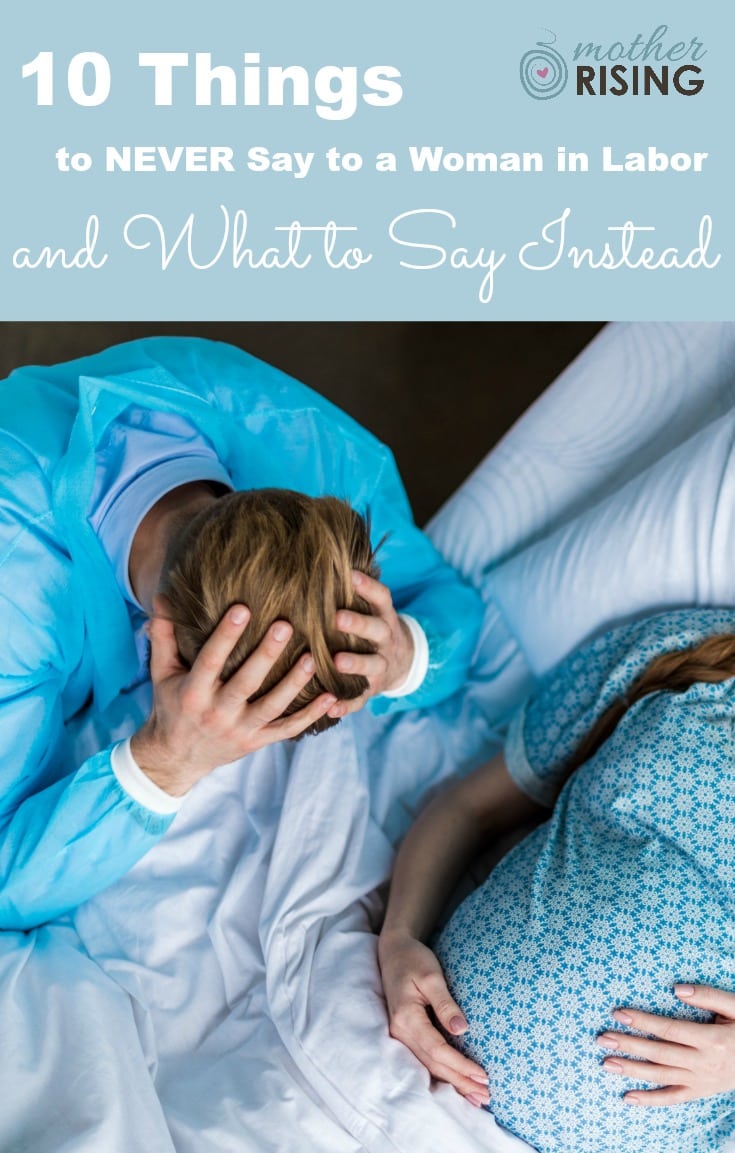In my years of birth work I have heard my fair share of golden nuggets said to laboring moms. Some things were truly golden nuggets – amazing, encouraging words spoken that were very helpful. And some were the other kind of golden nugget, likely coming from a good place, but nonetheless, unhelpful. This blog post is all about the latter nuggets also known as things to NEVER say to a woman in labor.
And as a gift to all the mothers out there, I’ll even tell you what to say instead. Birth team, care providers, dads looking for tips in the delivery room… ready to dive in? Let’s go.
10 Things to NEVER Say to a Woman in Labor
WARNING: Reading some of these might piss you off. They pissed me off. Prepare to get pissed.
TIP: If after reading this article you’re starting to thing that maybe your choice in care provider isn’t the best fit. It may be a sign that it’s time to fire your OB.

“You don’t have to be a hero.”
This is one of the most bothersome things on the list of things to never say to a woman in labor. If you take away one thing from this article, this is the one.
I have heard this phrase said to women in two scenarios. Scenario 1 is when a laboring woman is trying to decide whether or not to get an epidural and scenario 2 is after a laboring mom has received an epidural.
Scenario 1: If a woman is trying to make a rational and educated decision while in labor (a very difficult thing to do when in pain!) about whether or not to get an epidural (which is a big deal, by the way) by saying “you don’t have to be a hero” is playing to her emotions and vulnerability which isn’t fair. If she’s questioning this choice instead of immediately signing up for anesthesia, she likely has a reason for the hesitation. I guarantee she doesn’t want an unmedicated birth to become “a hero”. Maybe she was hoping for a natural birth, or wants to reduce the chance of further interventions like pitocin, or maybe she’s wanting the best start for her baby. I don’t know. But by saying “you don’t have to be a hero” to help her make a decision is basically blowing her off when she is in a very vulnerable position. It’s a low blow.
Scenario 2: If a woman has received an epidural when it was not what she wanted many people will want to help her to feel better about her decision by saying “you don’t have to be a hero”. I get that you want to help them to feel better, but really? We can do better than that. Again, we’re disregarding mom’s thoughts, opinions and feelings!
What to say instead: If a woman is trying to decide if she wants an epidural we could first continue to encourage her where she’s at. Could she just be asking for more support? Sometimes during a normally progressing labor when a woman asks for an epidural she is really asking for more support. Maybe she thinks that she’s not doing something right or that things aren’t progressing fast enough and because of that wants an epidural. Reminding her that she’s doing everything perfectly and that things are progressing normally can be very helpful. But say that this woman, for whatever reason, needs an epidural. One thing we can do is see if she has any concerns or questions about an epidural. Maybe mom wants to know the risks compared to the benefits. Either way, let’s not blow her off by saying “you don’t have to be a hero” but validate her concerns.
If a woman has received an epidural and it was not what she originally planned for, by saying “you don’t have to be a hero” you’re not being helpful. In fact, it is dismissing her feelings and making you feel better instead. If you want to help a woman process through difficult birthing decisions… validate her. Here are some things you could say:
- Tell her that what she did took a lot of courage.
- Tell her that it’s ok to be sad about losing out on an unmedicated birth.
- And that you know she’s a good mom and wants the best for her new baby.
- Tell her that sometimes all we can do is our best, and keep doing the next best thing.
- Tell her that even though the epidural was not her first choice, it’s important to still stay present and work hard for her baby. Say that her baby needs her to not check out.
“I hate to see you in pain.”
Once upon a time I was hanging out with an amazing woman in the hospital while she was in labor. She was rocking it. We were in the bathroom, things were really intense but there was nothing wrong and mom was handling things well (as well as you can in transition, you know?). In walks her well-meaning OB and she says, “I hate to see you in pain.”
Um. Get another job?
Another time, a well meaning grandmother was allowed into the L&D suite at the hospital to say hello to her daughter (Why did they let her in??!!). Her mother walks in with a worried look on her face, grabs her daughter’s hand and says, “I hate to see you in pain.”
Um. Go away?
You see, the problem with the phrase “I hate to see you in pain” is that they’re making the birth all about themselves. The observer doesn’t like the way she’s feeling, wants the laboring woman to stop being in pain… so that the observer can feel better. You guys, BIRTH IS ABOUT A MOM AND BABY, not about the birth team (or onlookers). Don’t make things about you, make it all about mom!
What to say instead: If a mom is in labor and things are intense, there is nothing wrong. Nothing is wrong! Nothing needs to be fixed! In fact, she is likely rocking it. And you know what? She needs to hear that. Tell her she’s rocking it! And tell her things are getting more intense because she’s progressing, which means she’s getting closer to meeting her baby. Tell her things are normal and she’s doing great. Tell her these things a lot. She needs to hear it from you.
“How are you doing?”
If possible, avoid asking a laboring mom questions that can’t be answered with a simple yes or no. As soon as signs of labor begin on into active labor, a woman’s “thinking mind” is quiets down while her body is works hard to deliver her baby. As labor progresses the thinking mind goes further and further away. All her focus and energy is being spent on coping through contractions.
The question “how are you doing” is even more difficult to answer because a laboring mom probably doesn’t feel very good. Maybe she’s tired, hungry, nauseated, in pain, or emotionally spent. Not only is this question difficult to answer because it can’t be answered with a simple yes or no, but it’s hard to answer because she doesn’t feel good… but she’s in labor so…
What to say instead: Instead of asking a laboring mom how she’s doing
- Offer her sips of a beverage with electrolytes or light snacks for labor.
- Tell her she’s doing so great.
- And how proud you are of her.
- Tell her she’s progressing, things are going well, and that soon she gets to meet her baby.

“Just relax.”
When labor gets more difficult and painful, a laboring mom might react by becoming fearful and tensing up. Unfortunately, when she tenses up, she will experience more pain, which will lead to more fear and tensing up… you get the idea. This is the fear => tension => pain cycle.
When a mom is fearful, tense and in pain, telling her to “just relax” isn’t very helpful. As much as she would love to, she probably doesn’t know how to relax.
What to say instead: Instead of saying something general and non-specific, try pinpointing things on her body she can relax.
- Say things like “relax your jaw”, “drop your shoulders” or “open your hands”. Maybe she doesn’t know how to relax, but she might be able to drop her shoulders.
- Also, it might be helpful to remind her to not fight each contraction, but accept it. Saying things like “let it happen” or “ride each contraction like a wave” might help her with that.
“What can I do?”
Asking a laboring woman “what can i do?” is sweet, and I’m sure well-meaning, but not that helpful. Like I previously mentioned, a woman in labor is not in her thinking mind, and she might not know how someone can help her out. You likely won’t get any good feedback when you ask her what to do.
What to say instead: Instead of asking her what to do, try anticipating her needs. If you’ve never been at a birth before, this might be a little difficult, however, here are some suggestions.
- Offer her water with a straw. Say, “take a sip”. A laboring mom needs 8 ounces of water per hours, so this is an easy need to anticipate.
- Create a calm birthing environment. If the lights are on, dim or turn them off completely. If people are chitchatting, politely ask them to stop or step outside. You might even be so bold as to turn on some music. 😉
- If she needs to get out of the tub or shower, think about what she’ll need in order to do that comfortably. Will she need a towel? New clothes? Slippers? Figure that out and make it happen.

“I’m so tired.”
During my last birth my husband said this quite often. It actually didn’t bother me, probably because I wasn’t in active labor for most of the experience. However, after he told me he was tired he would immediately apologize and say he wasn’t the one having a baby. Ha! You see, by saying that YOU’RE tired you’re making it all about you again. And really? If you’re tired, imagine how tired this laboring mama must be?
What to say instead: Find some coffee, brush your teeth, pull it together and be there for her. You can sleep another day (or year from now teehee). I don’t have a suggestion on what to say instead for this one. Just keep your mouth shut.
“Just breathe.”
Sometimes a laboring mom, in the midst of her intense labor, might not be breathing in a way that is helping her progress. Maybe she’s not breathing that much. Sometimes moms hold their breath as a way of coping through contractions. Maybe she’s taking quick, shallow breaths. Either way, what she’s doing is not working for her. There are a few helpful things to say to her instead of “just breathe”. Again, she might not know how to change her breath to better cope through labor.
What to say instead: Here are some things to say that are helpful.
- “Notice your breath.”
- “Deep slow breaths.”
- “Breathe for you baby.”
- “Notice your outward breath.”
- “Breathe with me… in… and out…. in… and out. Yes, just like that.”
“You need to be quiet.”
If you have a problem with a laboring mom being loud you probably need to leave her birth space. If a mom is being loud during labor or pushing she likely needs to vocalize as a way of coping through pain. Birth is noisy.
What to say instead: However, some sounds are more helpful than others. Here are some ideas to help mom vocalize in a way that conserves her energy and still allows her that outlet.
- Tell her to make deep, low sounds. High pitched sounds can make her tense, but low sounds can have the opposite effect.
- Vocalize with her. In fact, moan louder than her. By doing this you will help her to feel more comfortable vocalizing in the way she needs (which can be an odd thing for a woman to do as we are conditioned early on to be quiet).
- Suggest humming or singing.
- Suggest a mantra like “I can do it.”
“Don’t push.”
Sometimes a woman begins pushing before her cervix or her care providers are ready. If a woman is pushing involuntarily… it’s helpful to remember she can’t help it. By saying don’t push, neither mom or care provider will be happy.
What to say instead: Here are some ideas to say instead.
- “Let’s change position”. Sometimes by changing positions you can decrease the urge to push. If a mom has been in an upright position, try side-lying.
- “Try horse lips”. Blowing air through pursed lips can be a helpful distraction from the urge to push. Do this during contractions.
- “Tiny, gentle pushes only.” Mom might not be able to stop pushing, but she likely can not make her pushing as strong as can be. Focusing on gentle, small pushes is a way to slow the pushing down if it’s not time to push yet.
“You’re going to tear.”
Yes, I’ve actually heard an OB tell a mama she’s going to tear. Sigh.
What do you think is the physical response to hearing that you’re going to tear? Yep, to tense up. And tensing up is not one of those things that is helpful to prevent tearing!
What to say instead: If you think someone is going to tear, don’t tell them they’re going to tear! Instead tell them they’re going to get HUGE. Make it the mantra of the moment.
“I’m going to get huge.”
In Ina May’s book, Ina May’s Guide to Childbirth, which is an amazing natural pregnancy resource, this exact thing happened and when tearing was expected to happen… it didn’t!
“I kept thinking while I was pushing, I’m going to get huge. I’m going to get huge!” she said.”
― Ina May’s Guide to Childbirth
Our Words Matter
The spoken word is a powerful thing, and even more so for a woman giving birth. If you are privileged to attend a birth read this list, study up and make sure your words are gifts not curses.
Please share this post to spread the word about how to treat a lady in labor!

Link faron
Wednesday 16th of October 2019
If you think about it, some of the people panic and just say words they don't mean. The words here shouldn't piss you off but it should be a tip that you should say things to help the woman in labor.
"you don't have to be a hero."
now that saying is not needed.
"I hate to see you in pain."
ok, now this quote could mean different things. the creator of this page only focuses on the selfish parts, "saying that I hate to see you in pain” is that they’re making the birth all about themselves. The observer doesn’t like the way she’s feeling, wants the laboring woman to stop being in pain… so that the observer can feel better."
look, i don't think anyone has the time to think straight because giving birth is important so no one is focusing on themselves! their minds are too occupied with the woman screaming her ass off while pushing life out of her woman hole! so saying that does not mean that they are thinking of themselves but is worried for their loved one.
"I'm so tired."
yes i understand that after giving birth, the energy is literally sucked out of her but it's the same for the soon to be father. seeing their ladies in pain and struggling can make them feel anxious, and it activates their fight or flight instincts, but once the high is over, they feel tired too since the rush is out of them.
the rest of the words are pretty much explainable.
jessica
Thursday 9th of July 2020
You are literally why she wrote this. Birth is NOT about anyone else but the laboring mother. My husband wore a brightly colored shirt and I snapped at him. He turned cold and upset. The next time I delivered, we discussed this thoroughly and he told me he already picked out monochromatic clothing and apologized for his childish behavior.
Intentions don't matter during this time. You don't intend to run over someone's foot but it still hurts.
Fathers have a tendency to make it about them. They are vital roles, yes, but they are not the laboring mother.
Gabby Young
Wednesday 21st of November 2018
I sent my husband this article when I was 9 months pregnant with our second child as I thought it was a great refresher. I think every birth partner should read this at least once, but more likely more, during their partner's pregnancy.
Meahgan
Sunday 21st of January 2018
How about telling a mother to push before the baby is ready? My third LO was sunny side up. Cannot put into words how painful pushing was even with an epidural! After several unsuccessful pushes I looked at my stomach and asked my baby to please turn the right way. The nurse looked and me and said the baby has nothing to do with it, that it was completely up to me to get the baby out. I was furious. Still cannot stand that nurse. I was just about ready to give up. Luckily I’d had two previous pregnancies that were fairly easy; so I decided to take a break and lay on my right side for a bit and relax. Before I knew it my body started pushing on its own and he came out soon after.
Caitlyn
Friday 17th of November 2017
My daughter’s father is not a part of her life but my parents being the nice people they are call him to let him know his daughter was being born when I went into labor 3 1/2 weeks early. Shockingly he show up to the hospital it took all of 15 minutes of him being there before I had him kicked out. Why might you ask, because he asked me when I planned to start working out again cause if I lost the baby weight I might be hot again and he think about getting back together with me again. My dad almost got in a fist fight in the room with him. Lucky he is no longer apart of my life and my husband adores I and my daughter and we have started the process of him adopting her. We are expecting our second in May and I cannot began to tell you how different this pregnancy has been just because he is my rock.
Lindsey
Monday 27th of November 2017
I love this. So glad you have a rock!
Angelica
Wednesday 14th of June 2017
Hello I was 26 years old when i had my son ..i focused on reading on about pregnancy and newborn stage and never read anything about labour. I told my nurse while laboring that i have had a dream that i was not able to push my baby out and they had to use a forcep which had injured my baby's face ..it was a horrific dream which i couldnt stop thinkibg about .... My nurse ignored me while i told this story but brought it up while i was pushing telling me to push or we would have to use the forceps...can u believe that shit???? Im a nurse myself and i cant even think to use a deep fear like that to encourage any of my patients !!!